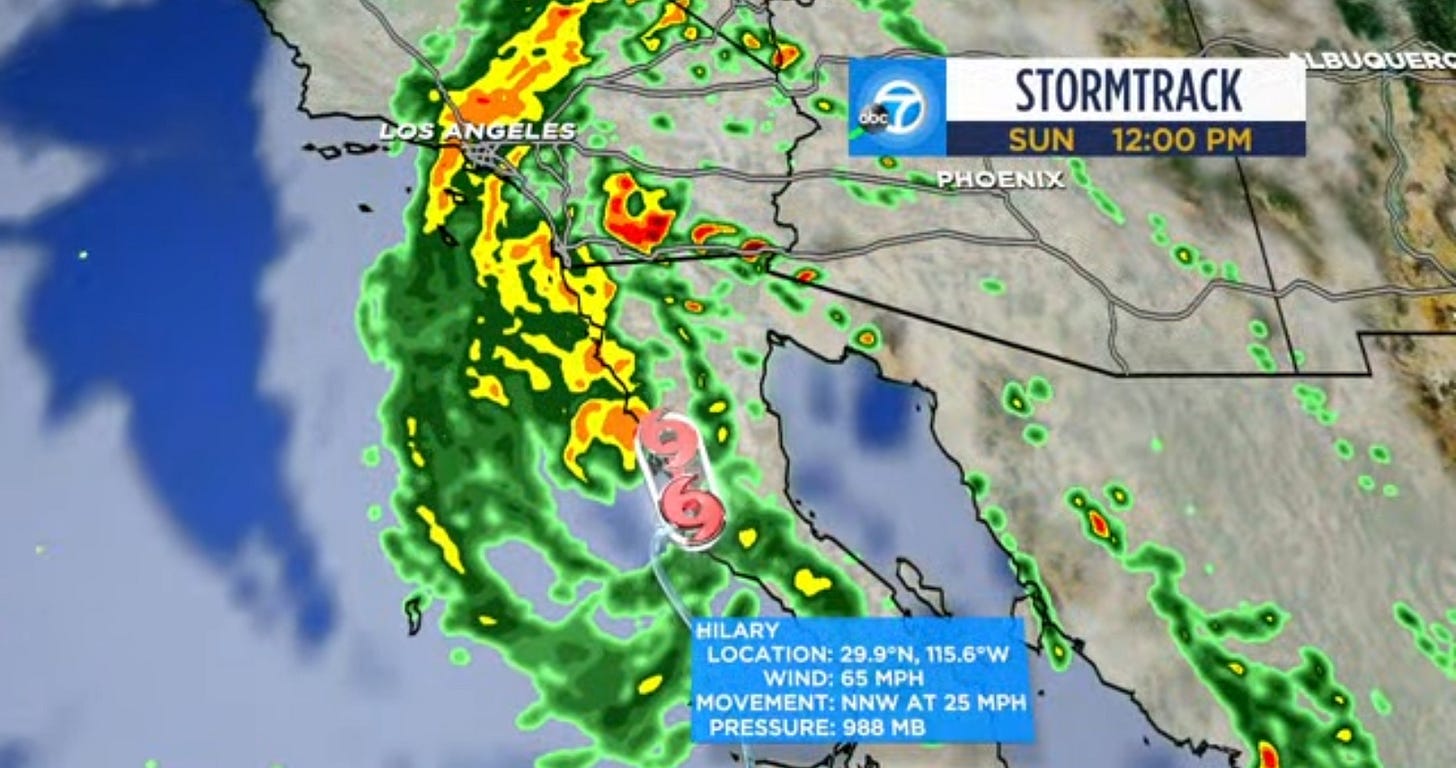So That Hurricane-Like Event They Said Couldn’t Happen In California? It’s Happening.
When does all the ‘unprecedented’ weather become officially ‘precedented’?
Tropical Storm Hilary hit Mexico Sunday and the National Hurricane Center warned of “catastrophic and life-threatening flooding” as Hilary progresses into Southern California and the southwestern US. Hilary’s impact was already felt on Sunday morning, as wind and rain battered the area, and conditions only worsened throughout the day.
This wasn’t supposed to happen. That’s what we were told at least. Climatologist Bill Patzert declared back in 2012, “[The] bottom line for Southern Californians is that even if global temperatures were to rise six degrees, a hurricane in California would rank very low on the list of things we’d need to worry about.”
He’d insisted, “The interesting thing is that it really can’t happen, statistically speaking. The odds are infinitesimal — so small that everyone should just relax. Like 1 in 1,000. Of course, there’s always a chance. But there’s a good reason why we don't name our West Coast sports teams the Hurricanes, but we do have the Rancho Cucamonga Quakes.”
In fairness to Patzert, who willingly alluded to “Rolodex” files in 2012, Hilary is no longer technically a hurricane, weakening Sunday to a tropical storm, but it’s still forecast to unleash a “life-threatening” level of flooding — up to 10 inches of rain in some areas — and the winds will likely knock out power for many residents. There’s also a likelihood of isolated tornadoes and 25-foot ocean waves.
This seems enough like a hurricane to suggest California has hit the inclement weather version of Powerball. How did this happen?
Tammie Souza at CBS News explains, “Hurricanes and tropical storms need very warm tropical water to form. The water needs to be 80-plus degrees to a depth of 100-150 feet. That’s why they are common in the Gulf of Mexico, Caribbean, and tropical Atlantic and Pacific Oceans. Not off the California coastline.”
A unnamed, real-deal hurricane came within several miles of California in 1858. The last tropical system to actually pass through the state was back in 1939. Usually, the tropical systems weaken significantly over the colder water of California and the rugged terrain.
That’s not the case with Hilary.
The Pacific Ocean waters are warming, on account of how the whole damn globe is warming. According to the Los Angeles Times, “July set a record for the highest monthly ocean surface temperature in [the National Oceanic and Atmospheric Administration’s] 174-year history. And specifically, ocean temperatures off the coast of Baja California are higher than normal, due to the warming effects of El Niño and the proliferation of fossil fuel emissions.”
Hurricanes have formed in the Pacific but prevailing easterly winds usually blown them out to sea. This time, those east-to-west winds are absent. This is due to an unusual ridge of high pressure that’s building over the central US, which will likely bring more extreme heat to the area. There’s also an unusual level of low pressure off the West Coast, so between the two, winds are blowing from south to north.
Hilary is so large that its impact will be felt across both Southern California and southern Nevada, where residents have been advised to prepare for “catastrophic” flash flooding.
Like when Texas experienced “unprecedented” winter weather in 2021, the situation is especially dire because there is little infrastructure for such conditions. California and certainly Nevada are hardly prepared for tropical storms.
Hilary’s one “upside” is that the storm is predicted to all but eliminate Southern California’s fire risk for the next several weeks, according to Jonathan O’Brien, a meteorologist with the National Interagency Fire Center’s Predictive Services in Riverside.
However, that might seem like a monkey’s paw outcome compared to what Hilary might ultimately inflict on California. In the meantime, a magnitude 5.1 earthquake struck 80 miles northwest of Los Angeles on Sunday afternoon. Please dispose of all monkey’s paws.
Follow Stephen Robinson on Bluesky and Threads.
Subscribe to his YouTube channel for more fun content.
Catch SER on his podcast, The Play Typer Guy.







I've been tracking research since the 80s and it seems like things are unfolding according to the middling-to-very bad scenarios the science nerds predicted. I don't like it at all. I wish they were wrong and I wish policy makers had listened.
https://substack.com/profile/18610262-boogie-mama/note/c-36853055?r=b2vrq
And I guess I'll gather all my wishes in one hand and shit in the other hand to see which fills up first. Science!!
Lovely Partner's Eldest literally just moved from VA to LA (grad school!) on Friday, with her girlfriend.
Then there was a hurricane *and* an earthquake.
Welcome to LA, Eldest of Partner!